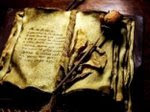
 SONG Song For You
SONG Song For YouWRITTEN BY Leon Russell
PERFORMED BY Donny Hathaway, Willie Nelson, Leon Russell
APPEARS ON Donny Hathaway (1972); Leon Russell (1972); Shotgun Willie (1973)
Leon Russell's classic "Song For You" takes as its starting point a tradition probably as old as songwriting itself: The troubadour seducing a estranged lover by professing everlasting love while asking his lover forgiveness for his flaws. I want to be what you want me to be, he sings, and I've learned so much from you. But I'll never be perfect, much less as perfect as you. Isn't it enough that "There's no one more important to me?" Isn't it enough that when I'm singing to "ten thousand people" I'm really singing to you? Because while I may be flawed, my love isn't: "I love you in a place where there is no space or time."
"Song For You" also demonstrates the power of a great song (not to mention seduction and love) to cross genres. It's hard to choose between Donny Hathaway's deeply soulful rendition and the direct intimacy of Willie Nelson's country-folk version. Hathaway's voice swoops and soars, demanding attention and inviting his lover to be one with him. Nelson's wistful country baritone is more of a gruff filter, tuning out the noise of the "ten thousand people watching" so that in the end there are only the two lovers. Either way, the message of "Song For You" -- that most quiet and intimate of songs -- comes through loud and clear.
LYRICS
A Song For You (Live @ The Troubador, Los Angeles, CA) - Donny Hathaway
I've been so many places in my life and time
I've sung a lot of songs, I've made some bad rhyme
I've acted out my love in stages
With ten thousand people watching
We're alone now and I'm singing this song for you
I know your image of me is what I hope to be
I've treated you unkindly but darlin' can't you see?
There's no one more important to me
Darlin' can't you please see through me?
'Cause we're alone now and I'm singing this song for you
You taught me precious secrets of the truth, withholding nothing
You were out front and I was hiding
But now I'm so much better
And if my words don't come together
Listen to the melody 'cause my love is in there hiding
I love you in a place where there is no space or time
I love you for my life 'cause you are a friend of mine
And when my life is over
Remember when we were together
We were alone and I was singing this song for you
We were alone and I was singing this song for you
A Song For You (Live @ The Troubador, Los Angeles, CA) - Donny Hathaway


 playlist!" border="0">
playlist!" border="0">
 Ringtones" border="0">
Ringtones" border="0">









